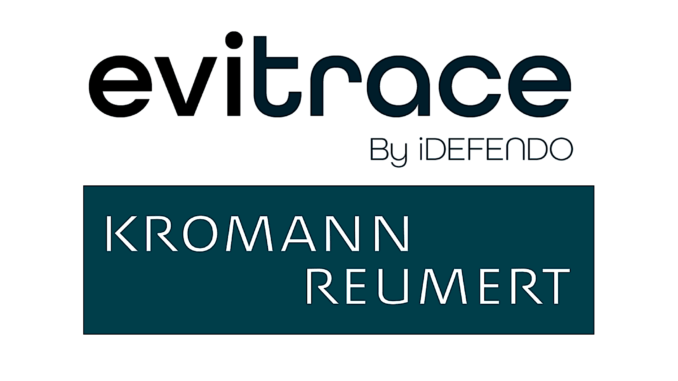
Kromann Reumert and Idefendo are collaborating on a blockchain project that works with Thomson Reuters’ HighQ VDR to provide an immutable data trail during M&A due diligence. Can ‘legal blockchain 2.0’ now succeed after the first wave of the technology failed to make an impact?
The leading Danish law firm is making use of Idefendo’s Evitrace tool, which is described as an ‘add-on audit log tool, that runs automatically behind the scenes in your HighQ VDR, Sharepoint, Office 365, Dropbox, or Google Drive, recording all activity in the background’.
The company explained that: ‘When the M&A or due diligence process in the data room is finished, the audit log generated by Evitrace can be downloaded and distributed to all stakeholders. Documents can be validated even after the data room is closed, even if you have downloaded them to another medium. Even the slightest change to the data or the timestamp will cause the validation to fail.’
‘A blockchain database is by design immutable, so data added to it can never be altered or removed. The system doesn’t store your actual documents in blockchain databases, only the ‘fingerprints’ of your data,’ they added.
It also comes with a dashboard that visualises the information that it has logged, which gives you the ability to quickly search large amounts of complex data.
Jacob Brønnum-Schou, Head of IT at Kromann Reumert, commented: ‘Blockchain can be particularly useful in the legal industry as most law firms are, among other things, burdened by a lot of paperwork, which blockchain is able to reduce significantly.’
The other key point for the firm is that because blockchain data logs like this are immutable then the lawyers have a record of the due diligence process that cannot be ‘altered, deleted, or destroyed’. This in turn ‘has the potential to significantly reduce the time spent on verification and the cost of verification – cost savings that clients will benefit from’.
The firm, which is clearly a fan of this approach, also stated that ‘blockchain adoptions and penetration are, however, still fairly low both in the business and government sectors. This is due, in part, to the fact that it is still a difficult technology to implement’.
Artificial Lawyer has traced the development of ‘legal blockchain’ tools since the early days. But it became clear a few years ago, at least for the first wave of solutions, that the technology was just not making headway among lawyers despite hopes it would make a big impact. Instead, lawyers got excited about advising clients on the legal issues around using cryptocurrencies – but – were not necessarily using any blockchain-based tech themselves for legal work.
Now, the goals seem to be a bit more modest, although there are still evangelicals out there. And this more limited approach may be what helps blockchain-based solutions to succeed a second time around.
As Peter Jidesten, CEO of Idefendo, noted: ‘Evitrace is the culmination of a more than five-year-long learning process, where we have gradually refined our offering with the help of fantastic partners.’
This site doesn’t really buy into the ‘blockchain will change everything’ thesis, but can see several specific use cases where the immutable and secure data logging capabilities can be useful. It’s a question of keeping sight of the real benefits and then proving the value for specific needs.
In any case, Kromann Reumert seem to be very happy with things so far.
‘Evitrace is a truly unique application of blockchain technology, and we are very pleased to be part of this pilot project using our HighQ Virtual Data Rooms and our own in-house developed contract management system. The application will support our legal advice and thus be able to make a positive difference to our clients,’ said Torben Waage, Knowledge Management Partner.
While M&A Partner, Jakob Hans Johansen, concluded: ‘We are very excited about testing this technology as the first law firm in Denmark. Blockchain and technology more broadly will change the way M&A processes are done, and we are trying to stay at the forefront of these developments in order to free up time spent on commoditised tasks and streamlining processes to the benefit of ourselves and, more importantly, our clients.’
Is this a big deal? As noted by the firm, this is a pilot. It’s also a very specific use case. Yet, ironically, this is perhaps what makes it noteworthy. Why? Because rather than pitching this as a life-changing event as most blockchain projects seem to have done in the past, this has limited and practical goals, and that suggests a new level of realism.
With realism comes the chance to ascertain genuine value, build trust in the approach, and the perhaps win more interest in the technology’s applications that will then stand the test of time and cope with real world use.
It has always felt that if blockchainers had made a far more limited pitch for the technology’s benefits, then it would have made far more progress. By coming in with the ‘this changes everything!’ line it set itself up for something that it could never deliver.
Also, the goal is clearly to get the blockchain tech to work in tandem with more traditional approaches, e.g. work with HighQ VDR, but to not try and replace it. I.e. it’s a supplementary technology that helps where it practically can.
So, overall, we should not get carried away, but this is a positive and practical development.
Just as the pen and paper, the typewriter, the word processor and eventually the P.C. are tools that have helped the legal industry be able to produce its products better, faster, cheaper, so too is the impact blockchain technology will have on legal. It is not, and never will be, a tool that changes everything, but as Gartner notes, we are past the hype cycle and heading towards practical uses of the tech. Could blockchain have an impact on chain of custody in e-discovery, for instance. I’m betting so.